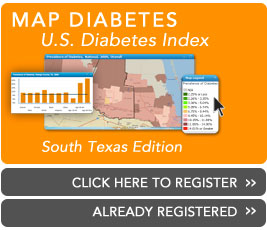Posted by Staff
Minority Diabetes Reports
Thursday, August 7th, 2014
SPRINGER: 25 Jun 2014
Aims/hypothesis
Obesity is a major risk factor for type 2 diabetes, but little is known about the contribution of BMI-associated loci to type 2 diabetes risk in East Asian populations.
Methods
In this study, 30 known BMI-associated variants and a genetic risk score (GRS) calculated by summing the BMI-increasing alleles of these variants were tested for associations with type 2 diabetes and related glycaemic traits in 1,873 cases of type 2 diabetes and 1,839 controls in Han Chinese individuals. Logistic and linear regression analyses were performed to determine the association with type 2 diabetes risk or related glycaemic traits, respectively, under an additive model with or without adjustment for BMI. Read More
Posted by Staff
Minority Diabetes Reports
Thursday, August 7th, 2014
Elsevier Inc: 3/10/14
Abstract
Objective
The objective was to evaluate how comorbid type 2 diabetes (T2DM) and hypertension (HT) influence depression treatment and to assess whether these effects operate differently in a nationally representative community-based sample of Black Americans. Read More
Posted by Staff
Clinical Trials
Thursday, August 7th, 2014
PLOS: August 04, 2014
Background
Incretin–based therapies which include glucagon-like peptide-1 (GLP-1) receptor agonists and dipeptidyl peptidase-4 (DPP-4) inhibitors are recommended by several practice guidelines as second-line agents for add-on therapy to metformin in patients with type 2 diabetes (T2DM) who do not achieve glycemic control with metformin plus lifestyle interventions alone. The purpose of this study is to perform a systematic review with meta-analysis of existing head to head studies to compare the efficacy and safety of GLP-1 analogues with DPP-4 inhibitors. Read More
Posted by Staff
Clinical Trials
Thursday, August 7th, 2014
PLOS: July 30, 2014
Background
Tree nut consumption has been associated with reduced diabetes risk, however, results from randomized trials on glycemic control have been inconsistent.
Objective
To provide better evidence for diabetes guidelines development, we conducted a systematic review and meta-analysis of randomized controlled trials to assess the effects of tree nuts on markers of glycemic control in individuals with diabetes. Read More
Posted by Staff
Clinical Trials
Thursday, August 7th, 2014
Diabetes Care July 30, 2014
OBJECTIVE To compare the efficacy and safety of new insulin glargine 300 units/mL (Gla-300) with glargine 100 units/mL (Gla-100) in people with type 2 diabetes on basal insulin (≥42 units/day) plus mealtime insulin.
RESEARCH DESIGN AND METHODS EDITION 1 (NCT01499082) was a 6-month, multinational, open-label, parallel-group study. Adults with glycated hemoglobin A1c (HbA1c) 7.0–10.0% (53–86 mmol/mol) were randomized to Gla-300 or Gla-100 once daily with dose titration seeking fasting plasma glucose 4.4–5.6 mmol/L. Primary end point was HbA1c change from baseline; main secondary end point was percentage of participants with one or more confirmed (≤3.9 mmol/L) or severe nocturnal hypoglycemia from week 9 to month 6. Read more
Posted by Staff
Clinical Trials
Thursday, August 7th, 2014
Diabetes July 28, 2014
Gut-derived hormones, such as glucagon-like peptide-1 (GLP-1), have been proposed to relay information to the brain to regulate appetite. GLP-1 receptor agonists, currently used for the treatment of type 2 diabetes (T2DM), improve glycemic control and stimulate satiety leading to decreases in food intake and bodyweight. We hypothesized that food intake reduction following GLP-1 receptor activation is mediated through appetite- and reward-related brain areas. Obese T2DM patients, normoglycemic obese and lean individuals (n=48) were studied in a randomized, crossover, placebo-controlled trial. Using functional MRI we determined the acute effects of intravenous administration of the GLP-1 receptor agonist exenatide, with or without prior GLP-1 receptor blockade using exendin9-39, on brain responses to food pictures, during a somatostatin pancreatic-pituitary clamp. Obese T2DM patients and normoglycemic obese vs. lean subjects showed increased brain responses to food pictures in appetite- and reward-related brain regions (insula and amygdala). Read More
Posted by Staff
Clinical Trials
Thursday, August 7th, 2014
Springer: 10 Jul 2014
Abstract
Aims/hypothesis
Since protein ingestion is known to stimulate the secretion of glucagon-like peptide-1 (GLP-1), we hypothesised that enhancing GLP-1 secretion to harness its insulinotropic/beta cell-stimulating activity with whey protein pre-load may have beneficial glucose-lowering effects in type 2 diabetes.
Methods
In a randomised, open-label crossover clinical trial, we studied 15 individuals with well-controlled type 2 diabetes who were not taking any medications except for sulfonylurea or metformin. These participants consumed, on two separate days, 50 g whey in 250 ml water or placebo (250 ml water) followed by a standardised high-glycaemic-index breakfast in a hospital setting. Participants were randomised using a coin flip. The primary endpoints of the study were plasma concentrations of glucose, intact GLP-1 and insulin during the 30 min following meal ingestion. Read more



























